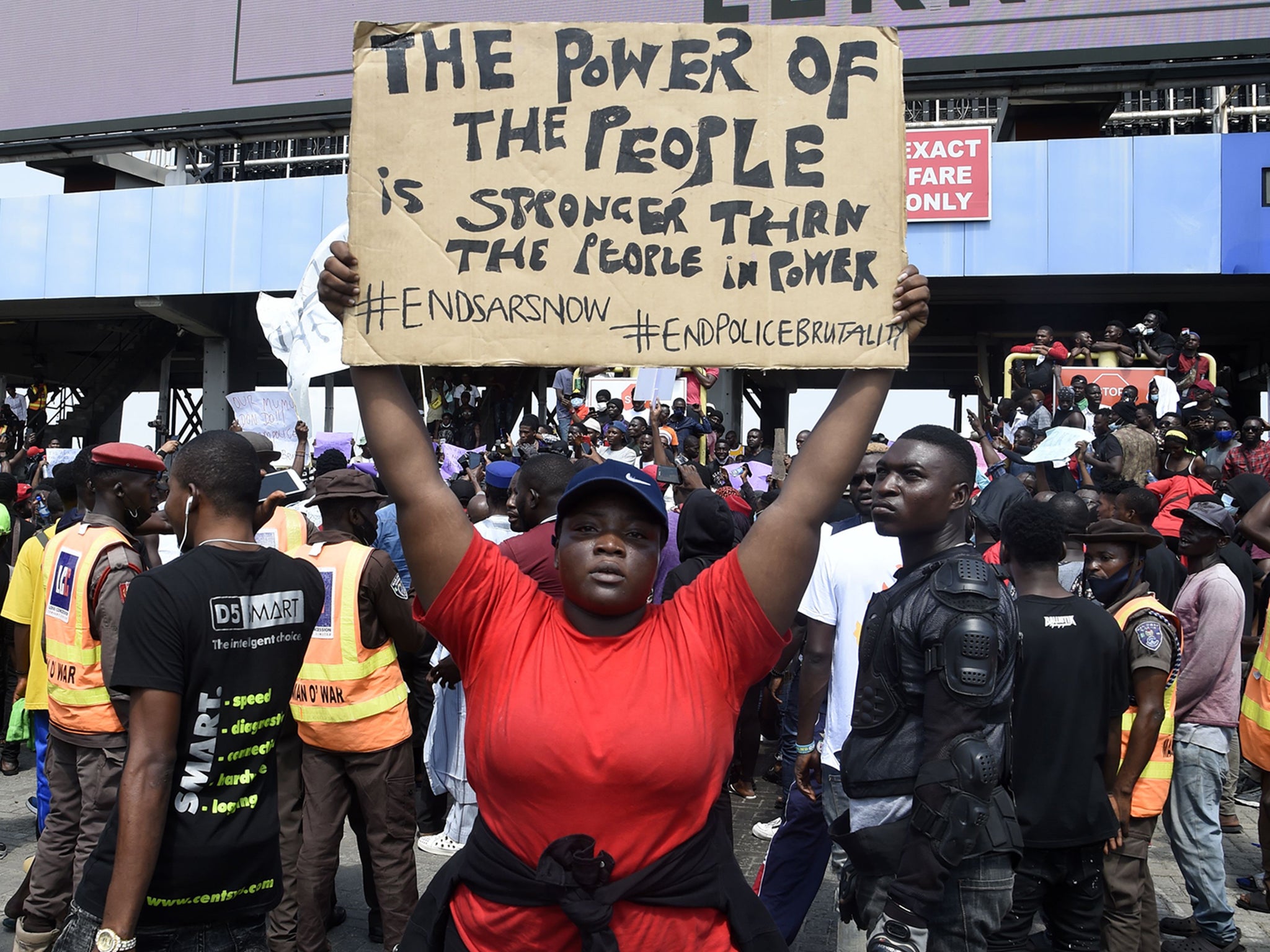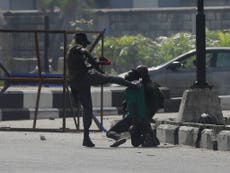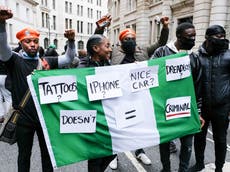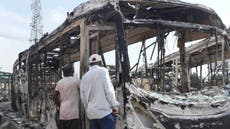My nephew was killed in Nigeria for wanting Biafra’s independence
As calls come from around the world to end the brutality of Nigeria’s controversial special anti-robbery squad, Solomon Uchenna Egbo remembers his nephew

Nothing will happen to you. You will survive, brother,” said one of the friends of my nephew as he lay on a hospital bed with two bullet wounds in his back. Another showed the scars from a similar wound to prove it. But my nephew didn’t stand a chance. There was nothing the hospital could do.
He died on Thursday 22 October at 6pm. Bullets fired randomly by the police into a crowd killed him. His friends looked on in disbelief. They broke the news to his parents. At 8pm my mother phoned me.
My nephew was 24 years old. His name was Chukwuebuka Aneke. I had not seen him for the best part of a decade because I must live in exile from my homeland, Biafra Land, annexed by Nigeria after the terrible war of 1967-1970. I believe in a free Biafra Land and therefore I cannot live in my home country and share the day-to-day goings on of my family. I wasn’t there when Chukwuebuka was shot. As is our custom, the funeral was the following day. I sat numb as I watched the video of the burial that I was sent. Chukwuebuka friends broken and devastated. This time it was Chukwuebuka. Who would be next?
You will have heard of the trouble in Nigeria. The demonstrations calling for the disbanding of SARS, the Special Anti-Robbery Squad of the Nigerian Police Force which, for years, has violated its state-sanctioned role to counter robbery and kidnapping by using extortion, torture, rape and murder to feather the beds of the police officers who make up its numbers.
Demonstrations, hashtagged as #ENDSARS, have successfully successfully ordinary people, celebrities and the Nigerian diaspora to oppose police corruption. SARS was notorious, but only one part of the corrupt architecture of Nigeria’s security forces. So the apparent disbanding of SARS this month has done little to simmer down the mood of the protestors, who suspect that many of the unit’s members will be transferred to a new SWAT team. Nothing will change in Nigeria.
For years SARS, and units like them, have been used to silence opponents of the government in Abuja and terrorise the peoples of Biafra Land and all across Nigeria. Because these recent demonstrations, and the brutal crackdown ordered by the government, have taken place in Lagos and Abuja, they have made the news across the world. But the Biafran people have suffered at the hands of the Nigerian police and military for decades. Thousands have been killed.
Peaceful calls for self-determination have been violently attacked, men and women beaten, raped and tortured in police detention centres. Road-blocks are set up for no reason other than to extort money from passing drivers. We have been starved, shot, macheted and driven from our homes, but very little of this reaches the world outside Nigeria. Until now.
Living under Nigerian occupation and forced to be part of Nigerian territory, Biafrans have suffered the brunt of violence meted out by the special squad in relative silence. SARS was deployed in Biafra Land by the Nigerian government to terrorise the people into silence.
Young men, like my nephew, who support Biafran independence, have been targeted, arrested and accused of robbery or stealing and then kept for weeks in police cells where they’re tortured to get them to “confess”. Some bribe the officers to let them go. Most can’t afford to. Some are never seen again by their families. All of this has been documented by Amnesty International in reports over the last few years, which go unheeded by the Nigerian authorities. Until the day he was shot, Chukwuebuka had been lucky. He’d manage to outwit SARS.
The special robbery squad has left footprints of horror and death on a seismic scale. It isn’t too much to say that SARS officers are criminals and merchants of death in official state uniforms. And all the officers in the squad – widely accused of unlawful arrests, extortion, torture and murder of innocent unarmed Biafrans – should, in a just world, face trial. But justice cannot be done in Nigeria. The victims and relatives (like me) will never get justice in a Nigerian court. There is no justice even in the Nigerian Supreme Court.
Chukwuebuka, like most of his contemporaries, believed passionately in Biafra. He hoped for the restoration of the country that was Biafra
My nephew Chukwuebuka was not in Lagos last week. He was filming a peaceful demonstration against Nigerian police brutality and corruption in his hometown of Enugu in Biafra Land. The demonstrators were attacked by members of the Nigerian Mobile Police, or Mopol, as they made their way down Mayor Agbani Road, a busy place lined with two or three-storey buildings. Chukwuebuka had been called by his mum just before, but he was excited and determined to be a witness to what might happen, so he promised to call her back.
He never did because, when the Mopol unit fired live ammunition at the crowd of protestors, my nephew was hit while he tried to get out of the way. He was taken to hospital by his friends. He died.
Chukwuebuka, like most of his contemporaries, believed passionately in Biafra. He hoped for the restoration of the country that was Biafra. Like the overwhelming majority of Biafrans, living in a free and independent Biafra was his dream, but he knew for that to happen, the Nigerian government in Abuja, the security forces and police have to be reformed and the corruption and violence ended, and yes, including the disbanding of units like SARS.
While the Nigerian authorities kill and maim with impunity, Chukwuebuka knew that the dream of Biafra would remain distant. The powers that be in Nigeria reign through chaos. That keeps them in power. For Biafra to be realised, Nigeria must first respect the rule of law. Biafra can only be achieved by peaceful means. Fighting violence with violence just leads to more violence.
Chukwuebuka knew that and he resisted all violence. In the context of the lawless world that is Nigeria, violence just plays into their hands. It’s as if they relish it. They want to turn Biafran self-determination into a violent campaign. That way they can use more violence. Denied violence, the rational demand for self-determination will succeed. Biafrans must not fall into their trap. The moment we resort to violence they win.
Biafrans are in an impossible situation. They are tortured and killed but must continue to turn the other cheek. At 8pm on 22 October this was rammed home for me. If only Chukwuebuka had gone home when his mother called.
No one will be held to account for his killing. It is we who are left behind whose grief is blurred with guilt. If we didn’t need Biafra to be liberated from Nigeria, would Chukwuebuka still be alive? I am a known figure in the Biafran diaspora. Some of the older people back home believe that people like me motivate the youth to protest and they are not happy with us because so many of our young people have been murdered by the oppressive Nigerian forces.
I have to reconcile myself with those observations. But we Biafrans have no choice. We live under tyranny. We have to protest and claim our right to self-determination. We must do so without violence.
Like most Biafran young men, Chukwuebuka was passionate about football. He supported Chelsea. I’d tell his mum and dad that it was time he supported a proper team. “Why support Chelsea? Manchester United are so much better,” I would tease. He also loved music. Afrobeat was his thing. But most of all he loved his two dogs – “he really likes dogs more than any other thing,” I was told once.
If it’s true that the kindness of someone can be judged by how they treat the animals they share their lives with, there was no one kinder than Chukwuebuka. His big wish was to come and visit me in the UK. He had hoped to live a decent life. Now there will be no visit, no decent life, no football and his dogs have lost their beloved master. We can only weep.
Others may react to the killings in Biafra Land and Nigeria with anger and a determination to fight back with whatever means are to hand. My view is different. Biafra will be restored peacefully. Biafra is our lost inheritance stolen from us through the barrel of a gun, masterminded by the British at the beginning of the 20th century. And then, following Nigerian independence back in 1960 the denial of Biafra was executed by successive Nigerian governments.
In the process, millions of Biafrans have been slaughtered by Nigeria. For the present generation of Biafrans, only the restoration of Biafra is the irreducible minimum compensation for all the men and women who have been killed over 50 years or more of persecution.
All those heroes and heroines who opposed that persecution with their bodies and minds only, peacefully and effectively; heroes like my nephew Chukwuebuka.
And because of those sacrifices, Biafrans will succeed in claiming their right to self-determination, especially if we adhere and apply ourselves only to a peaceful solution. If they won’t follow the law, we must. International law charts the path to self-determination.
For now, Nigeria is hell on earth for all indigenous peoples, especially Biafrans. Nigeria is a fake state. Britain created Nigeria in 1914 by forcibly bringing people together with wholly different value systems and demanding we co-exist. It was administratively convenient for them to lump the Yoruba, Hausa and Igbo peoples together along with countless other smaller tribes.
We had nothing in common and every reason to be wary of each other. It was a state doomed to fail from the start. We want the British government to acknowledge its mistakes and negligence, to eat humble pie if you will, and to intervene in the mess called Nigeria so that indigenous peoples can shake off the shackles of injustice, servitude and corruption.
#BlackLivesMatter is as relevant to Nigeria as it is to the US and the UK, maybe more so. In the maelstrom of empire and its demise, black lives weren’t a priority
I believe that there will be a peaceful solution to Nigeria if Britain, her creator, acknowledges the error. Many of those protesting in Lagos and the southwest of Nigeria want a federal system to replace the highly centralised government, dominated by generals and politicians from the north of the country. They propose a loose confederation of semi-autonomous states under the umbrella of a place called Nigeria. For me, it is too late for that. So much blood has been spilled and lives wasted. Biafrans proposed this in 1966. We were ignored and were left with no choice but to establish our own country unilaterally. Nigeria declared war. We were starved into submission.
I have written before about why I renounced my Nigerian citizenship. For me and millions of Biafrans, the only real solution now is the total dismemberment of Nigeria into free, independent states.
One of the biggest ironies, which is not lost on me, is that in Manchester, where I live, I can be a proud Biafran. I can campaign and protest for Biafra. Back home calling ourselves Biafrans puts us at real risk.
Protesting against Nigeria is putting your life in danger. Chukwuebuka’s death is just one of countless examples that prove this. Britain’s empire took away our identity, yet Britain in the 21st century allows me to be Biafran. But I am a Biafran without Biafra. I live in exile. If I returned, my persecution is inevitable. I cannot stop being Biafran. My nephew was killed for the cause that means I have no choice but to seek sanctuary in the UK.
My mum is heartbroken that persecution by Nigeria means I can’t live with her. Biafrans are very spiritual people. We believe in the afterlife. Mum has told me “so I won’t see you again until I die, and even when I join my ancestors you won’t be there to bury me because of your involvement with Biafra”. And I feel very bad about it. For me the only hope is to restore Biafra before my mum joins her ancestors so we can be together again in Biafra Land. But Biafra must be rebuilt without violence. Why won’t Britain back Biafra?
Grieving is never easy. The death of a young relative is particularly hard to bear. The hardest part is observing the pain and intense grief of a mother. My family feels helpless. We can’t have Chukwuebuka back, but we do want justice. We want to know that the police officer who gunned down and killed our brother, grandson, nephew, and son will be brought to justice. But not one police officer involved in this kind of atrocity has ever been prosecuted.
The philosophy behind the #ENDSARS movement is non-violent. It shares much in common with #BlackLivesMatter. #ENDSARS wants recognition for all those victims of Nigerian police brutality. It was a black police officer’s bullet fired recklessly that killed Chukwuebuka, but that does not condone the tragedy and make it more acceptable than if the bullet had been indiscriminately fired by a white officer.
#BlackLivesMatter is as relevant to Nigeria as it is to the US and the UK, maybe more so. In the maelstrom of empire and its demise, black lives weren’t a priority. Underpinning #BlackLivesMatter is the self-worth of all black people everywhere. Too often we need to be reminded of that. Linked directly to that self-worth is self-determination. All black people are also entitled to their right to self-determination. If that requires the dismantling of colonial legacies, so be it.
Nigeria has no shame. Chukwuebuka’s death is of no concern to the Nigerian authorities. His life did not matter to them. My hope is in death, he will one day rest in Biafra.
For all those who have been killed in these protests and in the name of freedom and self-determination. For my nephew, for his family and friends who followed his coffin to burial. For the dream that is Biafra. Please remember his name: Chukwuebuka.




Join our commenting forum
Join thought-provoking conversations, follow other Independent readers and see their replies
Comments